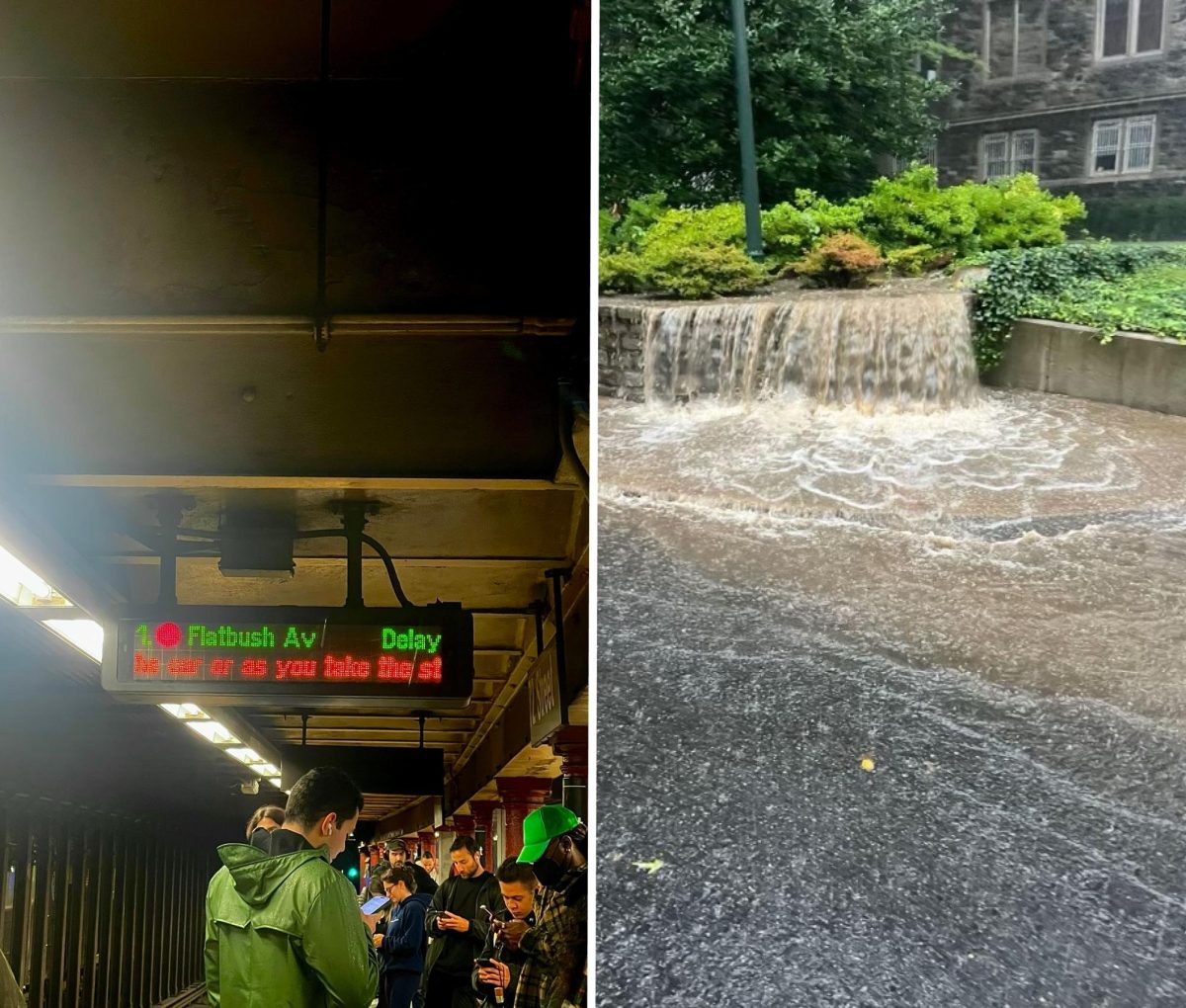Heavy rainfall across New York City on Sept. 29 disrupted public transportation, with the Metropolitan Transportation Authority (MTA) announcing suspensions, delays and rerouted train lines on Friday morning.
The National Weather Service (NWS) issued a flood watch for New York City that went into effect from Friday morning at 2 a.m. to Saturday morning at 6 a.m. The agency then issued its first emergency alert at 10:46 a.m. on Friday morning, notifying residents of a flash flood warning and the possibility of a life-threatening impact to urban areas. Shortly after, New York Governor Kathy Hochul declared a state of emergency, urging residents to stay at home in response to the severe weather warnings.
Cars stood at a standstill on the Franklin D. Roosevelt East River Drive throughout the morning of Sept. 29, and the NYC Emergency Management Department issued a travel advisory. LaGuardia Airport’s Terminal A was shut down, and flights in and out of the terminal halted until 4 a.m., Saturday, Sept. 30. Parts of the city, particularly Brooklyn, remain inundated. A NWS flood watch remained until 6 a.m., Sept. 30.
The university did not issue official guidance until approximately noon.
An email from Robert Fitzer, associate vice president of Public Safety, was sent Friday afternoon at 12:08 p.m. announcing that Fordham will continue to operate on a normal schedule. This email was sent shortly after the National Weather Service (NWS) issued a second emergency alert calling the flash flooding across the city a “dangerous and life threatening situation.”
Two hours later, Public Safety updated its weather advisory at 2:30 p.m., communicating that the Department of Transportation’s intercampus shuttle, Ram Van, would suspend its service after 7 p.m, with the last vans leaving the Rose Hill campus at 6 p.m. and the returning vans leaving the Lincoln Center campus at 7 p.m. The notice also stated that students with evening classes “should contact their instructors for direction” as the university remained on a normal operating schedule.
Before leaving home, Vishesh Chawla, Gabelli School of Business at Lincoln Center ’25, vice president of the commuting student’s association and a commuter first-year mentor, said that he reached out to Fitzer at around 8 a.m. to inquire about any changes being made to the university schedule.
In his response to Chawla at 8:46 a.m. — which came moments before transit companies announced major disruptions and the NWS’s emergency alert — Fitzer told Chawla to plan ahead for any potential delays or changes in his commute.
Chawla said he believes the university should have assessed the situation Thursday night or earlier on Friday morning, before 6 a.m., to prepare for 8:30 a.m. classes. He added he had received notifications from New Jersey Transit and the MTA about severe disruptions around 9 a.m, and, around half an hour later, the NWS issued one of two emergency alerts to New York City-area residents.
In response to these requests, Fitzer said that climate can be variable and the university cannot close because of flooding and transit disruptions. He highlighted that the governor issued a state of emergency around 10:30 am, with the university following thereafter.
The university did not issue official guidance until approximately noon.
Brianna Karishma, Fordham College at Lincoln Center (FCLC) ’25 and a commuter from Farmingdale, Long Island, said her commute Friday morning was timely. Karishma travels using the Long Island Rail Road (LIRR) to Penn Station, where she takes the A, C or 1 train to Fordham’s Lincoln Center campus, followed by the Ram Van to the Rose Hill campus.
Karishma noted she experienced minor delays but that she arrived on time to her first class at 10 a.m. She added that after arriving at the Rose Hill campus, there was flooding obstructing her from entering Dealy Hall. While she usually has three classes in the Bronx on Fridays, Karishma went home early due to concerns about the weather.
“I would rather come home as soon as I can before the Metro-North gets flooded and I can’t take that home,” she said.
For Karishma, the university’s communication to students, faculty and staff came way too late. She noted that Fordham should have been more lenient and understanding with students, especially those who commute to its campuses.
“You can have a completely indoors day at Lincoln Center regardless of how many classes you have,” she said. “But at Rose Hill, you have to travel around the campus, so that’s really difficult to do.”
The NWS also issued a flood watch warning for parts of the city, and from Hochul’s office on Sept. 28 urged New Yorkers to prepare for severe weather conditions the following day. The NWS then announced coastal advisory warnings for Brooklyn and Staten Island at 6:17 a.m.
According to Fitzer, the university announced through a banner on Fordham’s webpage that the university would operate on a normal schedule at 10:15 a.m. He noted Public Safety then issued the university-wide email that Fordham would remain open.
Fitzer also shared the Ram Van transported over 500 passengers safely to their destination and reported no incidents or accidents that occurred by drivers. He noted the decision to suspend the service was in collaboration with various departments, including the university’s Department of Transportation, the Office of the Provost, the Department of Public Safety and Ram Van.
“We considered factors such as class schedules, registered ridership, and driving conditions during the affected times,” Fitzer said. “We tried to notify riders in advance so they could make alternate arrangements.”
Christina Scott, FCLC ’25 and a driver for Ram Van, said she drove the shuttle during the early afternoon after most of the rain had cleared up. She expressed that she was not surprised the university was operating on a normal schedule but added that Ram Van services should have been suspended earlier than Public Safety’s announcement.
“I’ve been working for about ten years and there has been no excuse for inclement weather and going to work unless it was a life-endangering situation” Alex Peckham, Gabelli Graduate School of Business ’25
“I was definitely shocked, but also I don’t think Ram Van stops running unless classes are canceled,” Scott said. “If anything, I’m more shocked that classes weren’t canceled.”
Scott also shared concerns that she would not have been able to make it back to the Lincoln Center campus had her evening shift for Ram Van not been canceled.
With Public Safety advising students to reach out to their instructors, some chose to make alternative arrangements to their lesson plans.
Susan Greenfield, professor of English and interim associate chair of English at Rose Hill, hosted her class over Zoom after deciding it would be the most reliable option. Greenfield said that while she reached out to colleagues for advice on how to address working under the weather conditions, she hadn’t received any official guidance from the university.
“I teach in the Bronx and live in Manhattan, and between the weather alerts I was getting on my phone and the report of extensive MTA and Metro-North delays, I was concerned that I wouldn’t be able to make it to the Bronx Campus,” she said.
Not all Fordham students encountered strenuous commutes. Alex Peckham, Gabelli Graduate School of Business ’25, resides in the Upper East Side and experienced only slight delays while traveling on the Q train Friday morning. He shared that while the rain was a slight inconvenience, he believes the way students proceed during inclement weather is a personal decision.
“I’ve been working for about ten years and there has been no excuse for inclement weather and going to work unless it was a life-endangering situation,” he said.
Peckham noted that adjusting to uncertain weather situations is an expected part of working and adulthood.
“You just have to kind of suck it up and bring an umbrella,” he said.
He added he would support hybrid or asynchronous models during dangerous weather conditions but ultimately believes this discretion should be left to individual professors and students.
In response to student claims who fear repercussions for missing class because of weather concerns, Fitzer recommends students ask their instructors about alternate arrangements and noted that the university informs members of the campus community to consider local conditions when traveling to or from campus.
Karishma said she believes commuters should be offered more leniency in terms of excused absences due to emergency situations out of their control, such as the ongoing severe weather conditions and warnings.
“I would say it’s just as much a commuter school as it is like a regular college,” Karishma said. “So yeah, I think that they should maybe work on being a little bit more understanding of what could go on.”



